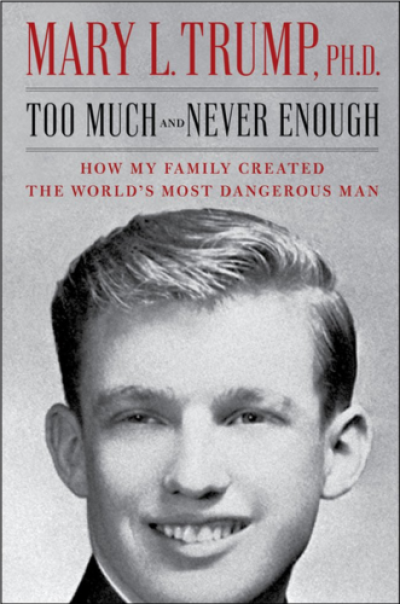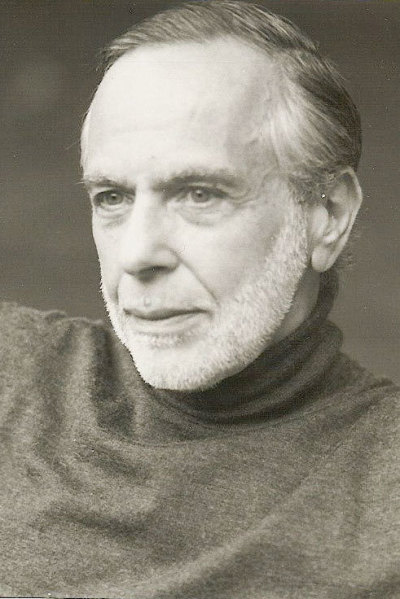Mary Trump abusing psychology to abuse her uncle

Before you open this book or turn a page, look at the cover. What do we see? A handsome, young Donald Trump, in dashing cadet uniform, during one of the finest periods of his life. In his five years at New York Military Academy, he reaped undiluted acclaim from faculty and classmates — a model student in behavior and academics, popular with classmates, a star athlete elected to the school’s Athletic Hall of Fame, garnering offers from Major League Baseball. For a book entitled “Too Much and Not Enough: How My Family Created the World’s Most Dangerous Man,” what is the meaning of this charming cover? Is it Simon & Schuster’s unconscious peeking through Mary Trump’s agonized victimization? Do they know something she is disinclined to acknowledge?
And turning to the book’s pages conjures another challenging image, a lexical one, Tolstoy’s opening line of Anna Karenina — “All happy families are alike, unhappy families are unhappy each in their own ways.” The story of the first proposition is yet to be written, since conflict — unhappiness — is inherent to life. Some families have more conflict, some less, but it is inescapable. Any family in Covid-19 lockdown will readily testify to this truism.

A Psychopathology of Everyday Life
Mary Trump turns all Trump family conflict into prima fasciae psychopathology. Relying as she does on fantastical speculation for thin formulations about the childhood experience of Fred Sr. and Mary Anne Trump’s complicated family of seven (decades before Mary Trump was born) further muddies her questionable psychological lens. Equally startling is the biased degree to which she views her deceased father, Fred Jr., — perpetrator of domestic wife abuse leading to divorce, repeated abject employment failures, and an ugly history of debilitating alcoholism that contributed to his early death — as the only “self-made” hero of the family. Even if one accepted her dubious psychological judgements, which I do not, her objectivity defies credulity.
Sibling Rivalry Beyond the Grave
The “anti-hero” Donald is everywhere depicted as a mere puppet of Fred Sr., in Mary’s view, coasting on Fred Sr.’s string pulling and money, even years after death (1999). Business facts like the testimony of Barbara Res, engineer on the Hyatt Hotel construction and chief construction manager in the building of Trump Tower are never broached. Res reveled in Donald’s unique creative capacity to change and uplift Manhattan neighborhoods, to defy convention, and described Sr. as an irrelevant nuisance, out of his league in Manhattan, tolerated and indulgently managed by Donald.
Mary’s incessant, ridiculing downgrading of Donald’s business successes is the dutiful love of a daughter for a deceased father — she seeks a victory for Fred Jr. in the fierce sibling rivalry with younger brother Donald that ever eluded Fred Jr. in life. Donald moved into the limelight of Fred Sr.’s favor that Fred Jr. angrily abandoned and repeatedly failed to win back. This battle protects her from disappointment and anger toward a father who failed her miserably, as she herself carefully documents. Donald, along with his entire family, is a lightning rod for raging emotions. This book could rightly be dedicated “For Dad.”
Blindness Toward One’s Own
Given Mary Trump’s penchant for psychological diagnoses (Fred Sr. and Donald are both “narcissistic” and “sociopaths”) that clinical lens is absent toward her parents. “Dad had clearly shared in the wealth early in his life, but he had had nothing left to show for it by the time he was thirty. I have no idea what happened to his money.” At age two-and-a-half, Mary watched in horror as her taunting father threatened to kill her sobbing mother with the rifle he was leveling at her. Or despite her mother’s phobia, he brought home a pet boa constrictor and kept it in the apartment. “Domestic abuse” is absent from Mary’s consideration. Or how about the concept of “enabler” for her mother? Fred Jr. was a deteriorating, recalcitrant alcoholic (his recurrent treatments paid for by Fred Sr.): “My father was still in the hospital [lobar pneumonia] on...their fifth wedding anniversary. Undeterred by his poor health and worsening alcoholism, my mother sneaked a bottle of champagne and a couple of glasses into his room. Regardless of what was happening around them or what state her husband was in, they were determined to celebrate.” Celebrate!
Mary projects all the pain and disappointment from her family into the nuclear Trump family. They are demonized with tortured, specious speculations about absence of love and isolation from the world of human contact. Fred Sr. is painted as the family architect of evil, a sociopathic narcissist, and Donald, his creation, is likewise, a mentally disturbed narcissist.
Narcissistic Personality Disorder
Since Donald F. Trump is our president, let me categorically reject the assertion that President Trump suffers a narcissistic personality disorder or is mentally disturbed. Other psychiatrists are in agreement (Begley, 2017). In fact, the very author of psychiatry’s Diagnostic and Statistical Manual of Mental Disorders (DSM) section on narcissistic personality disorders, Allen Frances M.D., stated that Trump does not demonstrate such a disorder, and even further, concluded that Trump is not mentally ill (Frances, 2017). Professor Frances is unequivocal: “Trump doesn’t meet DSM criteria [for any mental disorder][.] ... I wrote the criteria and should know how they are meant to be applied: Personality disorder requires the presence of clinically significant distress/and or impairment” (Begley, 2017).
Ingratitude and Entitlement
Although Mary Trump spent years attending family functions, playing at the Trump “House” as a young child, was sent to private boarding schools, high-end summer camps, included in endless special family celebrations dinners, there is rarely a hint of gratitude, pleasure or enjoyment. These occasions have become her bête noires, choice opportunities to demonstrate Trump family dysfunction and personal slights. Yet, she continued to participate as a teenager and young adult, when if she was so displeased, she could have stopped. Repeatedly she complains of not receiving the financial bounty of the Trumps. She even bemoaned her father’s subsequent absence of his Jaguar, Mustang, fishing boats, and airplanes. For a woman purportedly writing a book devoid of financial considerations, she has penned a book riddled with them.
As a young adult, fresh from college, her uncle Donald offered Mary a job writing a book for him — The Art of the Comeback. He provided her with an office in Trump Tower and names of significant and prominent people who would meet with her, and they did. When Random House ultimately fired her, Mary’s explanation is that Donald was at fault since he did not sit for an interview. During that period, she was with him many times, flew with him in his private jet to Mar-a-Largo and was a guest there. Personal responsibility is absent from her considerations throughout the book except for the Trumps — they are responsible for everything.
On a personal note, I might understand Random House’s decision. Apart from the draw of the anti-Trump, gossip-like, tirades, I found the writing of this book pedestrian. Descriptions of homes read like lists from a furniture catalog and the style lacks imaginative, poetic metaphor. The ending of the book felt tacked on to be au courant and suffered from the unsavory use of psychological attack as a front for personal and political differences.
Caveat Emptor
As the source of the New York Times article unearthing Trump finances, the paper’s longest article in history, Mary sealed herself unfavorably in Trump history. Her vengeance is reflected throughout the book, but most shockingly and disturbingly in the final paragraphs. Mary shares her delight in grotesque thoughts of President Trump envying a murderer and imagining himself one. It is a final caution to the reader — rageful fantasy overrides objective reason in all that you have read.
And one final note — take another look at the cover.
Dr. Sheldon Roth is a retired psychiatrist and professor of psychiatry at Harvard Medical School. His latest book is, "Psychologically Sound: The Mind of Donald J. Trump."





















